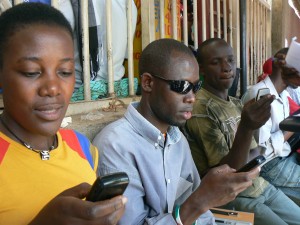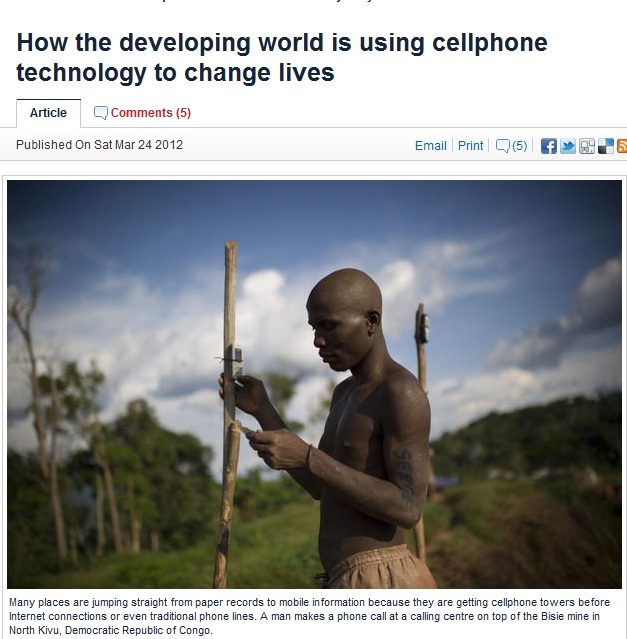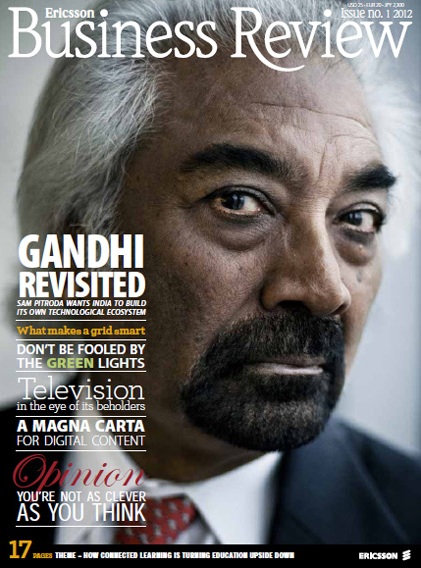Here at Frontline, we recognize that each user has specific needs, operating on a wide variety of platforms. That’s why, over the last decade, we’ve tried to makeFrontline as configurable as possible to meet these needs, wherever you are. With our new APIs, you can push messages and information in and out of FrontlineCloud – letting you keep data where it’s most useful to you. To get things started, we’ve preconfigured an integration into one of our favourite digital campaigning and management platforms, Nationbuilder. You can use Nationbuilder and Frontline together to RSVP to events and to update contact records inside your nation.
Understanding Mobile Access From an Ecosystem Perspective
The expansion of mobile access has been a common refrain in international development for years now. It plays an important role in supporting human development, from economic and educational opportunities to political freedoms and human rights. Increased access to mobiles has been linked to positive social outcomes in dozens of countries.
Planning and assessment of mobile phone use: effective SMS in Cambodia from World Vision UK
Assessing whether to use SMS is even more important than figuring out how to do it, as Joshua Pepall, World Vision’s United Kingdom Senior Accountability Advisor in Phnom Penh, Cambodia, reports in a special guest blog post. Improved accountability to communities and value for money are hot topics for World Vision and for the UK Department for International Development (DFID), which funds the accountability for development pilot that l support in Asia, Africa and Latin America.
Accountability and quality assurance guidelines like the Humanitarian Accountability Project (HAP) and INGO (International NGO) Accountability Charters highlight the need for agencies to effectively provide accurate and timely information to communities on project plans and activities. Doing this is not always easy.
World Vision development projects work through area development programmes (ADPs). ADP Catchment areas can be made up of dozens of villages, hundreds of households and thousands of people. A real challenge for World Vision staff is how to effectively communicate programme information to community members quickly, cheaply and effectively. Organising a meeting can take days and may not the best use of people’s time, or represent good value for money. Using SMS to provide basic information on project activities and to coordinate community engagement events seemed like one solution.
Mobile phone usage in Cambodia is remarkably high - everyone seems to have a phone. Judging by the number of people that own two or three, owning multiple phones is somewhat of a status symbol as well. Phones are relatively affordable here - a Chinese 3G phone can cost as little as $60 while a basic Nokia is as little as $18. Some estimates put the number of mobile phones registered in Cambodia at 13 million (BubbleCom, 2012). Nine mobile phone operators have invested heavily in mobile phone infrastructure and there is almost total coverage across the country.
It’s easy to get excited by new technology like FrontlineSMS, and start using it before listening to the people who will receive the information and give them the opportunity to decide if SMS is their preferred communications channel.
Effective information provision to communities of project information requires careful planning - you need to identify who your community audience is, and target your approach to that audience. Luckily, we had the flexibility and time to do this.
Our national and World Vision UK teams developed a simple community assessment questionnaire designed to learn more about community mobile phone usage, the cost of SMS and cell cards, phone ownership and the kind of information people wanted from World Vision.
We learnt a lot. Some of our assumptions were also challenged. Age did not seem to be the big obstacle to mobile phone use as we had anticipated and even the poorest village community members had phones and used SMS. People also wanted to use SMS to report issues of domestic violence in the communities to World Vision staff. Potentially, Frontline SMS might be able to be used for a variety of applications and not only to send information.
Rather than compile a big report about the assessment we set ourselves the challenge of communicating the results in one page - the infographic on the left.
So what next? We’re still SMS novices and learning as we go. We will be trialling the use of Frontline SMS in one village to send SMS to households on the date and time of community meetings and project information. By starting small we hope to learn what works and does not. By getting some wins under our belt we hope to then roll it out to other ADPs.
The Toronto Star: "How the Developing World is Using Cellphone Technology to Change Lives"
FrontlineSMS has recently been featured in an article in the Toronto Star, which provides an overview of information and communication tools being used for development (ICT4D). You can find an extract of this article below, and the full version is available online here.
In Nigeria, a young girl can ask questions about sex discretely through SMS and get accurate information. After the earthquake in Haiti, survivors in remote towns could receive money for food straight to their cellphone. In Senegal, election monitors sent updates on polling stations through their mobile phones, revising an online map in real time with details about late openings or worse. Projects like Learning about Living in Nigeria, MercyCorps in Haiti and Senevote2012 in Senegal are just a few examples of how the rapid spread of mobile technology has changed life in the global south.
Many places are jumping straight from paper records to mobile information because they are getting cellphone towers before Internet connections or even traditional phone lines. This means that for the first time it’s possible for a doctor in Guatemala City to monitor a newborn baby in a rural part of the country...
In 2001, just eight out of 100 people in the developing world had a mobile phone subscription. Now, nearly 80 out of 100 do...
FrontlineSMS
This software allows anyone to set up their own communications hub to send mass messages, manage automated SMS systems and collect data from the field. FrontlineSMS allows users to connect their mobile phone to a computer, transforming communication into something more powerful and manageable.
“If you go to the developing world and you look at how cellphones are being used you can really see that people are already doing this kind of organizational management, communicating with stakeholders, communicating with people they’re working with and for,” said spokesperson Laura Hudson.
The system enables easier management of SMS messages and also allows users to set up mailing lists, collect data and code automated reply systems. Traditional procedures involved checking in over the phone with remotely dispersed members of, for example, an aid team.
“Instead of that they can send an SMS. It’s cheaper for them, it saves time and the data can go straight into their report,” said Hudson.
FrontlineSMS was used to coordinate aid response after the 2011 floods in Pakistan and to manage reconstruction in Haiti. It has also been used to remind HIV patients of best practices and nutritional information.
Many other valuable technologies are featured in the full article from Toronto Star.
Ericsson Business Review: "Lessons on Learning"
FrontlineSMS Founder Ken Banks was interviewed by The Ericsson Business Review last year, and this interview has now been made available online. The interview focuses on how we often define innovation too narrowly, and why “development issues such as education require us to start with the problem, not the technology”. A summary is available on the Ericsson “Networked Society Blog” here, and the full interview is available in pdf format here. You can find an extract of the interview below:
What role can mobile technology play in development?
Mobile networks open up the possibility of reaching communities that would otherwise miss out on any meaningful connection with the rest of the world, and allow them to engage, make themselves heard and to be empowered by information.
You have been involved in many fruitful mobile-centered development initiatives. What separates the successful projects from the unsuccessful ones?
The single most important thing is starting with the problem and not the technology. It is quite common for people to grab the latest smartphone or iPad or whatever happens to be hot at the moment and try to figure out how it could be used in a development context. This approach can work, but most of the time it is destined to fail. If you go in with technology as your main objective, you will end up shoehorning it into contexts where it will not always work. The solution to a development question could be pencils or paper – it does not necessarily need to have anything to do with ict. I think that the correct sequence should instead be problem-people-technology. By “people” I mean the individuals at the grassroots who usually understand the problem better than anybody else.
To read the full interview, please click here.
Back to the future: 17 things you might not know about FrontlineSMS
In late October 2005, an early beta - "proof-of-concept" - version of FrontlineSMS was released to the world. It took just ten months for the idea to shape itself into the early stages of what you see today. In this, the second and last of our sixth birthday celebration posts (you can read the first here), we dig deep into our email archives and reveal some of the more interesting early - and perhaps surprising - moments of the project. The idea for FrontlineSMS was conceived in early 2005 with the help of several field trips to South Africa and Mozambique, a bottle of beer and "Match of the Day". All is revealed in this fun, short National Geographic video:
The very first email which specifically references FrontlineSMS was sent on 6th March, 2005 at 0853 to register the domain name.
Prior to that the working title was "Project SMS". The first email to reference "Project SMS" was sent on Wednesday 26th January, 2005 at 12:02. In it, the entire concept was described in just 963 words with an initial estimated budget of just £2,000 ($3,000).
Factoring in equipment and other costs, personal gifts totaling £10,000 were secured on 16th March, 2005 from two former Vodafone directors.
"The potential for FrontlineSMS is very exciting, and I am very much looking forward to working on the project. The potential impact for conservation and development is considerable." - Email to one of the supporters, 3rd May, 2005.
Preparation for the project officially got underway with the purchase of equipment totaling £1,476.09 on 22nd May, 2005:

One month later the timeline for the project was laid out. FrontlineSMS was delivered bang on schedule. From an email on 22nd June, 2005:
"I will begin working on the specification over the next couple of weeks, and will then get stuck into the initial programming phase during August. I have allocated that whole month to FrontlineSMS. As per the original timeline, July will be preparation, and August to September development time, so by October we should have something to trial."

News of FrontlineSMS was first revealed to the media in an interview with the Charity Times in August, 2005. Software development was briefly paused on 26th August so that the first FrontlineSMS website could be hastily put together ahead of the article's release.
"I have very high hopes that FrontlineSMS is really going to open the door to SMS technology to the wider NGO community" - Email to World Wildlife Fund, who were interested in trailing the software. 2nd September, 2005.
On 29th September, 2005 FrontlineSMS was presented for the first time at an internal event at Fauna & Flora International in Cambridge, UK:

On 5th October, 2005, to celebrate its imminent launch, FrontlineSMS buys up 200 pixels on the Million Dollar Homepage, a site which has since gone down in Internet folklore. (Read more on this here).
Email, 6th October, 2005: "Google now gives us around 80 results when searching for FrontlineSMS". Today the number is well over 100,000.
Email to supporters, 31st October, 2005: "The FrontlineSMS texting system is now ready for trial". These nine words signaled our official launch exactly six years ago today.
Email dated 14th November, 2005 from the MacArthur Foundation: "The MacArthur Foundation's Technology Grants Committee is always looking for innovative applications of technology for the NGO sector. I'd love to have a chat with you about your application if you have the time". Two years later MacArthur would become the first donor to make an investment in FrontlineSMS with a $200,000 grant. This funded a major rewrite and a new website.
14th November, 2005: 160 Characters are the first mobile-focused news site to announce the release of FrontlineSMS.
15th November, 2005: We receive an email enquiry from Kubatana, a Zimbabwean civil society organisation. Days later FrontlineSMS had its first official implementation. Kubatana still use FrontlineSMS today.
Today, with fifteen staff over three continents, users in over 70 countries across 20 different non-profit sectors, and approaching 20,000 downloads, the rest - as they say - is history...
Mobile technology: Developing Africa?
 By Kike Oyenuga, FrontlineSMS Project Assistant
By Kike Oyenuga, FrontlineSMS Project Assistant
The ICT4D community has often turned its head towards the potential role of mobile in African development. But a challenge posed by the Royal African Society at an event at London’s School of African and Oriental Studies last week was: “Are the claims that mobiles are aiding development as clear as they seem?”
FrontlineSMS Founder, Ken Banks, participated in the debate titled, “Mobile technology: Developing Africa?” which set out to offer fresh perspectives to this increasingly analyzed sector. Ken was joined on a panel by Marieme Jamme, CEO of SpotOne Solutions and co-founder of Africa Gathering and Nick Short, a lecturer at the Royal Veterinary College who is working in mobile disease surveillance in East Africa.
The panel discussed the ways in which mobile technology is helping both to improve the flow of information both within development organizations and also providing increased access to information in Africa more generally. The discussion covered a range of topics; the role of innovation, the many potential uses of mobile for development, and the role of corporate responsibility of mobile phone operators and manufacturers.
The presenters gave accounts from their personal experiences working with mobile technology in their respective fields, and explained why it is such a valuable tool with broad application potential. Also discussed were the challenges of applying mobile technology effectively in rural or remote settings and the importance of scaling down technology to fit the capacity of the people using it the most.
Drawing on his experience of combining his role as a veterinarian with technology, Nick Short spoke of using mobile mapping and geo-spatial tools in his work in documenting and tracking livestock diseases and possible epidemics and said that the technology could be used in many types of crisis mapping. He gave the current East Africa food security issue and real-time aid donation as prime examples.
Adding to a point emphasized in Marieme’s presentation - on the importance of mobile technology to maintain connectivity to vulnerable communities - Ken then focused on the macro view of how mobile technology can transform engagement of development and aid work. He noted the challenge that people with various skill sets are often located far from the people they are helping, and it is by connecting these groups that stakeholders can benefit from each other.
Technology allows more people to be involved in the process of development, by strengthening capacity and simultaneously allowing those that benefit to have agency in how technology is applied in their respective communities. Citing multiple examples of this, Ken elaborated on the use of FrontlineSMS technology in the poll monitoring process by Nigerians during the recent presidential elections, as an example where people were empowered to conduct election monitoring on their own terms.
Questions for the panel underscored the continued debates around mobile’s role in African development. One audience member questioned whether mobile phone companies were being socially responsible enough in giving back to the communities that they profit from. This was underlined by her assertion that companies provide a vital service to people in developing nations yet set the cost of phone credit at a price prohibitive to most. This audience member also wondered at the irony of it costing less to call Africa from the UK than someone in Africa calling her. Ken’s response was that we needed to a look at the broader picture. He highlighted the fact that much of the mobile infrastructure that we see across Africa today was built by private sector investment, and that if rolling out telecommunications across the continent had been an international aid project we’d likely not be anywhere near where we are today.
An overarching message embodied by the discussion was that the development community musn’t be mesmerized by technology, rather it should focus on the context in which it will be used and allow for appropriate solutions to evolve while bearing that in mind.













 Today, with over 500 million mobile subscribers across Africa alone, and more people around the world owning a phone than not, mobile phones seem to be everywhere,” points out FrontlineSMS founder Ken Banks in the opening post of our National Geographic
Today, with over 500 million mobile subscribers across Africa alone, and more people around the world owning a phone than not, mobile phones seem to be everywhere,” points out FrontlineSMS founder Ken Banks in the opening post of our National Geographic 
